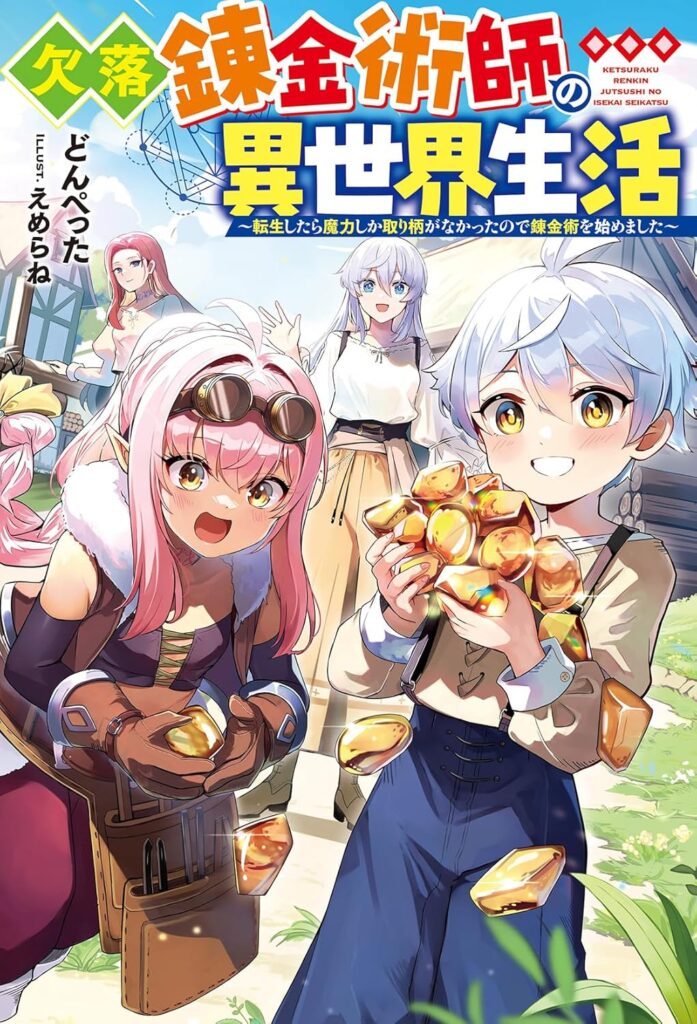
Kays Translations
Just another Isekai Lover~
Chapter 10: Glasses
The following morning, the whole group set out together, visiting shops to properly equip Rugena.
For clothing, she wore the type of thick, roomy trousers that dwarves favored—reminiscent of jeans—and over a black tube top, she had a brown jacket. Around her waist, she fastened an extra-wide belt that doubled as a tool holder.
For her weapon, we purchased a war hammer identical to the one she had wielded during her adventuring days: a full-length 130 cm hammer, complete with a hammerhead and an anchor claw, perfectly suited to her height.
Next, we went to a supply guild to buy materials for alchemy.
The guild carried everything essential for production: building materials like wood and stone, metals, medicinal herbs, and materials from animals and magical beasts. For this trip, we bought small amounts of quartz fragments and various metals, along with tiny samples of common alchemical ingredients.
[Meruestat – Inn]
After finishing our shopping and lunch, we returned to the inn.
Mother took a brief rest before going out again with Stefana, leaving me behind to make Rugena’s glasses.
That meant it was time to begin preparations.
Since we knew Rugena was nearsighted, I would make concave lenses. The lenses would follow the standard “curved concave” shape, and I would create several of different thicknesses to find the ideal prescription. I carefully noted the lens shapes, sizes, and other specifications on paper—this would serve as a blueprint for the alchemical forging, so every detail had to be accurate.
Next came the arrangement of the transmutation circle.
According to the alchemy texts, a “heating transmutation circle” could melt gold, silver, and copper, but not iron. In other words, there was a limit to the temperatures such a circle could generate. I didn’t remember the exact melting point of quartz, but I had the impression it was heat-resistant, so I prepared two heating circle diagrams just in case. In addition, I prepared diagrams for purification—to remove impurities—and shaping—to form the lenses.
“Since shaping is the final step, let’s put it at the center,” I murmured to myself.
Once preparations were complete, I drew the composite transmutation circle: shaping at the center, heating circles to the sides, and purification below. With the circle drawn, I activated a domain sphere and placed a fragment of quartz inside.
“One for now,” I whispered.
I used a single heating diagram to see if the quartz would melt.
“Well… it won’t melt with just one,” I muttered, then applied the second heating diagram to increase the temperature.
“Ah, so one heating diagram produces over 1,000°C,” I noted. Copper melts around 1,000°C, so if this could melt copper, the diagram was capable of at least that temperature. Roughly speaking, glass melts somewhere between 1,000°C and 2,000°C.
Once the quartz fragment melted, I used purification to remove impurities. Then I stopped the heating and began shaping the molten quartz into a lens. After letting it cool, I removed it from the domain sphere.
“Perfect… just as I imagined,” I said with satisfaction.
The completed lens was perfectly circular, free of distortion or scratches—a flawless piece.
“…Um, wh-what exactly are you… doing?”
Rugena, sitting on a chair by the entrance, had apparently missed the process of forming the glass.
“You couldn’t see from there?” I asked.
“No, no, I managed to catch a glimpse… but what was that? How did you make glass?”
“Oh… right, I hadn’t explained that part,” I said sheepishly.
I had mentioned glasses and lenses, but I hadn’t told her I could actually use alchemy. Worse, when I revealed that I could do it without a transmutation platform, she crouched down, clutching her head in disbelief.
“Uh… are you okay?” I asked.
Rugena stood abruptly and came closer, gripping my shoulders with intensity, her eyes wide and stormy.
“Not okay! What are you?! Rud? Materialization? Glass?! I’ve never heard of such alchemy!”
I scratched the back of my head, muttering, “Y-yeah… sorry about that.”
Even after stepping back, she continued muttering to herself: “I don’t understand this… this can’t be real…”
“Oh, and by the way, Fana mustn’t know I made the glasses,” I added.
“Why not? She knows you can use alchemy, doesn’t she?”
“Yes, but Mother told me to keep it a secret, so… just in case.”
Stefana knew about my alchemy and materialization abilities, but she hadn’t reported them to the baron. So even if I showed her what I had made, she likely wouldn’t tell anyone. But Mother seemed determined not to reveal anything, including the glasses.
“…Stefana’s in a delicate position, isn’t she?”
“She’s a slave of the baron, so she doesn’t really have a choice,” I said.
Regaining my focus, I handed Rugena one of the lenses to try.
“Here, try this,” I said.
I instructed her to hold it up and look at something in the distance.
“—O-oh! I… I can see! Even the letters, from far away!”
“That’s… good to hear,” I said, smiling. I hadn’t expected her to be this thrilled; in my previous life, wearing glasses had been ordinary once your eyesight weakened.
We then experimented with different prescriptions, making several lenses to find the clearest one. For the frame, we used silver to avoid any allergy issues.
“How’s it feel?”
“It’s… clear! Amazing!” she exclaimed.
Since the glasses weren’t fixed in place, they bounced and slid with every movement, making them impractical for combat. So next, I decided to make goggles suitable for battle.
The goggle frames would be made of metal, but without touching the skin. Some parts were mesh to allow airflow and prevent fogging. The lenses were rectangular and wider than the glasses. Where the frame touched her face, I added padded leather to maintain a small distance from the skin. The strap was a 3 cm wide fabric band tied at the back.
“These should stay in place even if you move around in combat,” I said.
Though we were still inside the inn and couldn’t move vigorously, she shook her head to test the fit.
“All good! They won’t fall off!” she said, spinning around excitedly.
Overjoyed, she suddenly realized something.
“Rugena, now you can work at the forge with these, right?”
“—?! Y-Yes! I can do it!”
Her excitement overwhelmed her. She hugged me and twirled around, repeating “I can, I can!” until I felt nauseated. I finally stopped her with a gentle chop to the forehead.
“Sorry,” she said, still catching her breath.
“Okay, no more spinning,” I said.
Despite only being slightly shorter than me, she was a dwarf adult woman, and her strength was far greater than her appearance suggested.
“Got it. I’ll be careful,” she promised.
Once she stopped feeling dizzy, I asked, “Do you understand forges well?”
“Of course! We dwarves learn how to make furnaces from the start!”
Her hands on her hips, chest puffed out, she looked adorably like a little child showing off.
More importantly, if Rugena knew how to make a furnace, we could restart the abandoned forge in the village—assuming the village chief hadn’t gotten too angry after the last incident.
And then…
“Hey, Rugena, when you say ‘ono,’ are you talking about yourself?”
“…S-sorry. I-I mean, me?”
She flinched, though it wasn’t necessary.
“It’s fine to say ‘ono’ if it’s easier in the moment,” I reassured her.
“Really? At the slave market, they told me to stop,” she said.
“As long as you do what’s asked, I don’t mind the wording,” I replied.
“That’s a relief… ‘I’ is hard to say,” she admitted.
It didn’t affect understanding, so it was fine.
“Al, I’m home,” Mother announced.
“Welcome back, Mother. Where’s Fana?” I asked.
Mother had returned, but Stefana was not with her.
“She’s in the dining hall,” Mother said.
“Dining hall?”
“Yes, I’m having a little welcome party for Rugena, with food and drink,” she explained.
At the mention of alcohol, Rugena straightened up, even saluting with tears in her eyes.
I hadn’t expected Mother to throw a welcome party. She hadn’t done anything for Stefana before, so I thought she kept a professional distance.
“The dining hall?” I asked again.
“No, this room. The dining hall has too many people around,” Mother explained.
Normally, slaves didn’t eat at the same table as their master—so this was a special occasion.
“And… is that the glasses Al mentioned?”
“Those are goggles,” I corrected, explaining that goggles were better for combat, while glasses were fine for everyday use.
“Can I see the goggles?” Mother asked.
“Of course,” Rugena said, removing them. I noticed faint redness around her eyes. Though the leather was soft, it had rubbed slightly from movement.
“Rugena, don’t use the goggles yet,” I advised.
“Why not?”
“Your eyes are a little red,” I said.
Rugena looked in the mirror and gasped, gently touching the irritated area.
“But it’s just a little—”
“No. If your skin gets red so quickly, you won’t be able to wear them for long,” I said.
“Ah… yes, that makes sense,” she replied.
I wished there were a gentler material, like foamed rubber—but I had never seen rubber here. I’d seen how to make it on a quiz show, so it went onto my “to make eventually” list.
“…Lord Arthur, could we use core material instead?”
“Core material?”
I had never heard of it. Rugena explained that it was a common material for blacksmiths.
The core came from slimes and was soft, absorbing shock. Mixed with a hardener, it could be adjusted for firmness and used as padding inside armor to reduce strain on the wearer.
“So, the slime core is probably with the magical beast materials?”
“Most likely,” she said.
We hadn’t looked at the magical beast materials during our shopping, so I hadn’t known.
